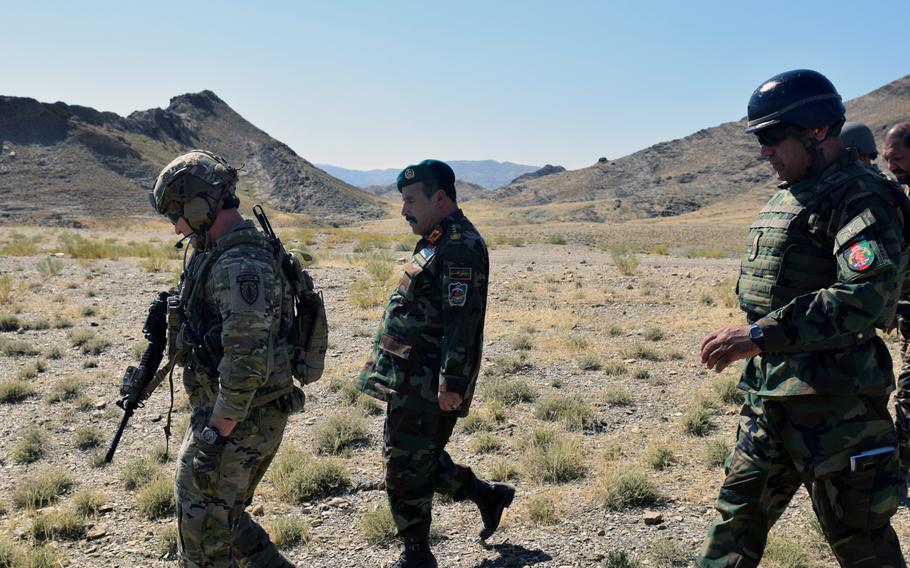
Advisers from the 2nd Security Force Assistance Brigade talk with Afghan forces during their June 2019 deployment to Afghanistan. Most advising has been done remotely since mid-March, an inspector general report said Tuesday. (Jonathan Camire/U.S. Army)
KABUL, Afghanistan — The U.S.-led NATO coalition in Afghanistan has suspended face-to-face advising three times since February and has generally stuck to remote methods since mid-March, an inspector general report said Tuesday.
Advisers with the NATO Resolute Support mission were restricted from meeting Afghan troops and trained via phone calls, emails and text messaging apps like Whatsapp, even as Taliban violence flared in the country, said the report to Congress by the Lead Inspector General for Operation Freedom’s Sentinel.
Coalition advisers have been prevented from almost all face-to-face meetings since March 14 due to concerns over the spread of the coronavirus, the report said.
Remote advising can help protect U.S. and coalition troops from COVID-19, combat casualties and insider attacks, but there are clear drawbacks, said Jonathan Schroden, director of the Special Operations Program at CNA, a nonpartisan research organization based in Virginia.
“It is much harder to advise troops and to build the relationships and trust that’s required to do this in a foreign country, if you’re not standing shoulder-to-shoulder with the partner force,” Schroden said.
Coalition troops have resumed some high-level advising in person, as shown by visits by U.S. forces commander Gen. Scott Miller to a few Afghan corps headquarters.
But most advisers are allowed only minimal face-to-face interactions with Afghan troops and government officials, except when mission essential, the report said.
“Our first priority is protection of the force. We continue to advise Afghan partners through the use of technology,” NATO’s Resolute Support mission said in a statement.
Three Afghan troops deployed throughout the country told Stars and Stripes that remote advising has led to some difficulties, while two said it didn’t affect their missions.
“It is very clear that communicating with them in person was much easier and effective than getting advice and help from them over the phones,” said Hasamudin Sadaat, a captain with the 215th Maiwand Corps. “Now, you cannot explain fully what you need, sometimes there are misunderstandings, so Whatsapp and other communications can only help halfway.”
Remote advising can’t replace in-person training, “but it can augment it,” a U.S. Army Special Forces officer wrote on the “War on the Rocks” website Wednesday.
It’s proved useful in Iraq and Syria and could allow training to continue post-deployment, wrote Maj. Gordon Richmond, a student at the U.S. Marine Corps’ School of Advanced Warfighting.
Other analysts remained skeptical of its use on a broad scale.
In Iraq, it was used mainly with elite fighting forces, Schroden said.
It might also work with Afghanistan’s commandos but would be less effective with conventional army and police units, said Schroden, who said he anticipates corruption will increase in the absence of adviser oversight.
Zubair Babakarkhail contributed to this report.
lawrence.jp@stripes.com Twitter: @jplawrence3